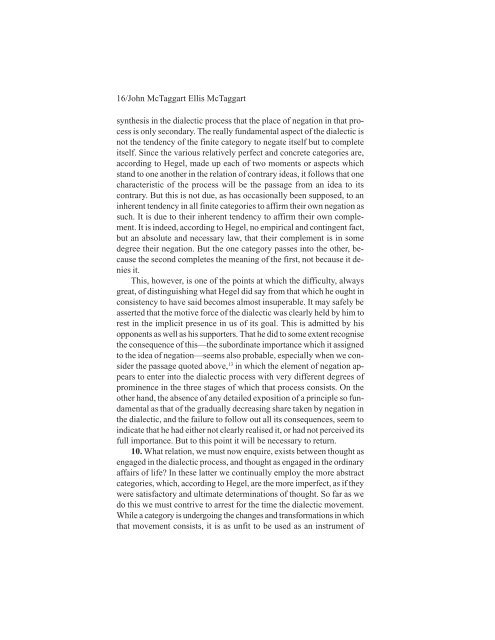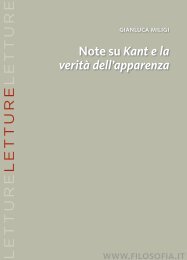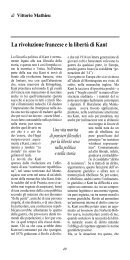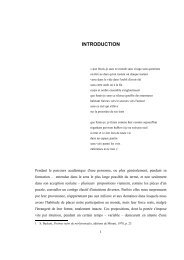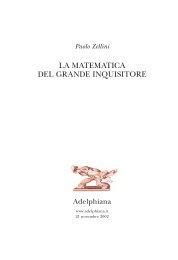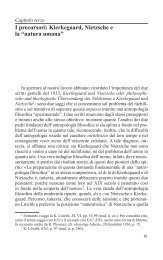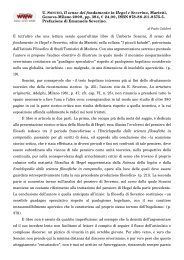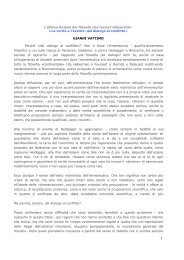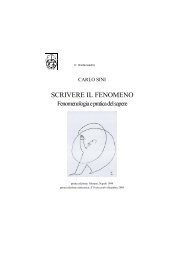McTaggart, Studies in the Hegelian Dialectic
McTaggart, Studies in the Hegelian Dialectic
McTaggart, Studies in the Hegelian Dialectic
You also want an ePaper? Increase the reach of your titles
YUMPU automatically turns print PDFs into web optimized ePapers that Google loves.
16/John <strong>McTaggart</strong> Ellis <strong>McTaggart</strong><br />
syn<strong>the</strong>sis <strong>in</strong> <strong>the</strong> dialectic process that <strong>the</strong> place of negation <strong>in</strong> that process<br />
is only secondary. The really fundamental aspect of <strong>the</strong> dialectic is<br />
not <strong>the</strong> tendency of <strong>the</strong> f<strong>in</strong>ite category to negate itself but to complete<br />
itself. S<strong>in</strong>ce <strong>the</strong> various relatively perfect and concrete categories are,<br />
accord<strong>in</strong>g to Hegel, made up each of two moments or aspects which<br />
stand to one ano<strong>the</strong>r <strong>in</strong> <strong>the</strong> relation of contrary ideas, it follows that one<br />
characteristic of <strong>the</strong> process will be <strong>the</strong> passage from an idea to its<br />
contrary. But this is not due, as has occasionally been supposed, to an<br />
<strong>in</strong>herent tendency <strong>in</strong> all f<strong>in</strong>ite categories to affirm <strong>the</strong>ir own negation as<br />
such. It is due to <strong>the</strong>ir <strong>in</strong>herent tendency to affirm <strong>the</strong>ir own complement.<br />
It is <strong>in</strong>deed, accord<strong>in</strong>g to Hegel, no empirical and cont<strong>in</strong>gent fact,<br />
but an absolute and necessary law, that <strong>the</strong>ir complement is <strong>in</strong> some<br />
degree <strong>the</strong>ir negation. But <strong>the</strong> one category passes <strong>in</strong>to <strong>the</strong> o<strong>the</strong>r, because<br />
<strong>the</strong> second completes <strong>the</strong> mean<strong>in</strong>g of <strong>the</strong> first, not because it denies<br />
it.<br />
This, however, is one of <strong>the</strong> po<strong>in</strong>ts at which <strong>the</strong> difficulty, always<br />
great, of dist<strong>in</strong>guish<strong>in</strong>g what Hegel did say from that which he ought <strong>in</strong><br />
consistency to have said becomes almost <strong>in</strong>superable. It may safely be<br />
asserted that <strong>the</strong> motive force of <strong>the</strong> dialectic was clearly held by him to<br />
rest <strong>in</strong> <strong>the</strong> implicit presence <strong>in</strong> us of its goal. This is admitted by his<br />
opponents as well as his supporters. That he did to some extent recognise<br />
<strong>the</strong> consequence of this—<strong>the</strong> subord<strong>in</strong>ate importance which it assigned<br />
to <strong>the</strong> idea of negation—seems also probable, especially when we consider<br />
<strong>the</strong> passage quoted above, 13 <strong>in</strong> which <strong>the</strong> element of negation appears<br />
to enter <strong>in</strong>to <strong>the</strong> dialectic process with very different degrees of<br />
prom<strong>in</strong>ence <strong>in</strong> <strong>the</strong> three stages of which that process consists. On <strong>the</strong><br />
o<strong>the</strong>r hand, <strong>the</strong> absence of any detailed exposition of a pr<strong>in</strong>ciple so fundamental<br />
as that of <strong>the</strong> gradually decreas<strong>in</strong>g share taken by negation <strong>in</strong><br />
<strong>the</strong> dialectic, and <strong>the</strong> failure to follow out all its consequences, seem to<br />
<strong>in</strong>dicate that he had ei<strong>the</strong>r not clearly realised it, or had not perceived its<br />
full importance. But to this po<strong>in</strong>t it will be necessary to return.<br />
10. What relation, we must now enquire, exists between thought as<br />
engaged <strong>in</strong> <strong>the</strong> dialectic process, and thought as engaged <strong>in</strong> <strong>the</strong> ord<strong>in</strong>ary<br />
affairs of life In <strong>the</strong>se latter we cont<strong>in</strong>ually employ <strong>the</strong> more abstract<br />
categories, which, accord<strong>in</strong>g to Hegel, are <strong>the</strong> more imperfect, as if <strong>the</strong>y<br />
were satisfactory and ultimate determ<strong>in</strong>ations of thought. So far as we<br />
do this we must contrive to arrest for <strong>the</strong> time <strong>the</strong> dialectic movement.<br />
While a category is undergo<strong>in</strong>g <strong>the</strong> changes and transformations <strong>in</strong> which<br />
that movement consists, it is as unfit to be used as an <strong>in</strong>strument of


